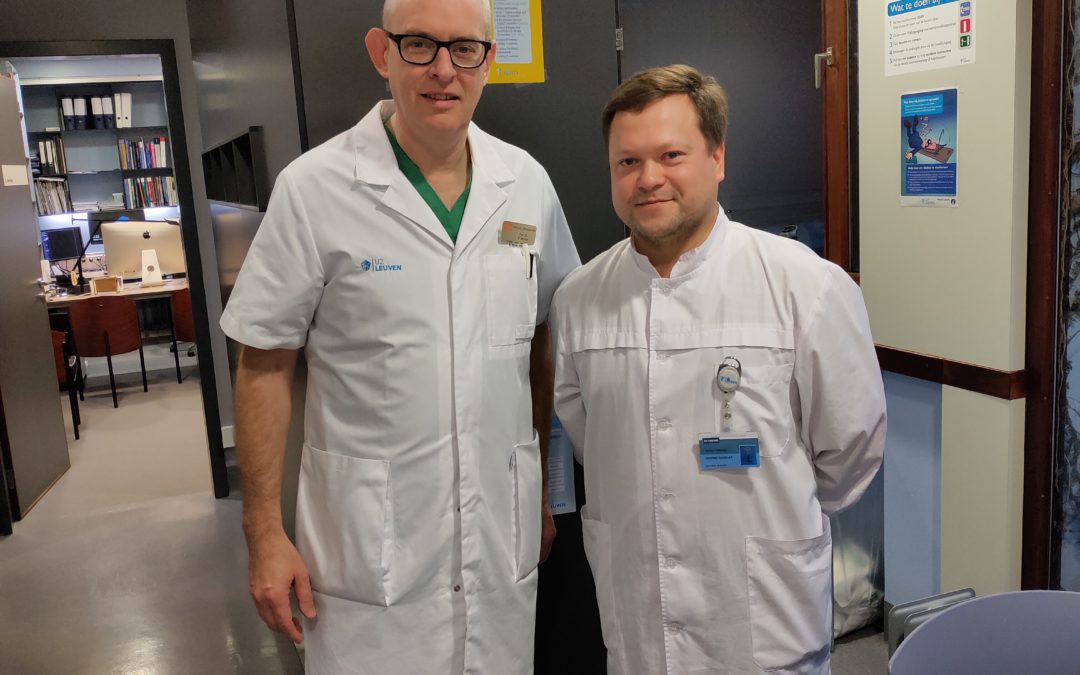We are happy to share the experience of one of our EFIC Fellows, Aleksei Potaturko, who had the opportunity to attend the EFIC fellowship at the Leuven Centre for Algology & Pain Management of the University Hospitals Leuven in Belgium:
“My fellowship took place at the Leuven Centre for Algology & Pain Management of the University Hospitals Leuven (Belgium) under a grant from the European Pain Federation from November 4 to December 6, 2019.
The Leuven Centre for Algology & Pain Management, headed by Professor Bart Morlion, is located on the Pellenberg campus, where outpatient and rehabilitation care is provided to patients with various pain syndromes. The clinic employs anesthetists, physiotherapists, rehabilitation specialists and psychotherapists. The doctors of the center actively use scales, tests and questionnaires, adapted to fill in the medical history. An obligatory element before the procedure is the assessment of the pain syndrome by the patient on a visual analogue scale (VAS), as well as the construction of VAS schedules during dynamic observation.
In the center, interventional methods of treating pain syndromes are widely used: CT-controlled blocks, blocks under the control of ultrasound, diagnostic blocks. Depending on the pathology and purpose (diagnosis or treatment) the following blocks are used: sympathetic blocks, root blocks, epidural blocks, transforaminal blocks, blocks and radiofrequency destruction of facet joints. Blocks of the peripheral nerves, sacroiliac joints, piriformis muscular are carried out under the supervision of ultrasound. For the diagnostic and therapeutic purpose of complex regional pain syndromes, phantom pains, cerebrovascular headaches, trigeminal neuralgia in the algology center, sympathetic blocks of the ganglion stellate, sympathetic trunks are widely used. A prerequisite for conducting sympathetic blocks is the measurement of local temperature and the assessment of the autonomic reaction before and after the procedures. To correct spasticity, for example, in case of patients with post-traumatic injuries of the spinal cord, an epidural pump installation for the introduction of muscle relaxants is used. Intrathecal injection of drugs allows to reduce the dosage and reduce side effects of drugs, while maintaining the therapeutic effect. Also, intravenous infusions and tests with lidocaine, ketamine are used in pain treatment.
Every week, employees of the algological center meet for a multidisciplinary team meeting. Doctors of various specialties, together with physiotherapists and psychotherapists, discuss cases of patients with complex clinical situations and resistant pain syndromes – this is the way multidisciplinary treatment of the patient is carried out. In the Leuven Centre for Algology, lectures are regularly held for employees by leading specialists directly involved in the treatment of patients with pain syndromes.
The center staff gives lectures for patients with chronic pain and their families. Doctors of various specialties explain what “pain” is, how it becomes chronic, the relationship of pain with the emotional sphere, how to behave in these situations, what treatment methods are currently available, indications and contraindications to them, which specialists treat pain – that is an element of cognitive-behavioral therapy. Lectures conducted by doctors of various specialties are held in the form of communication with patients, and issues arising are simultaneously discussed.
In addition to working in a rehabilitation center, employees of the algological center regularly consult patients in various departments of the main hospital (pain counselling at Campus Gasthuisberg). Consultations of algologists are prescribed by physicians when it comes to pain syndromes that do not fit into the clinical pattern or to non-stop pain syndromes. During the fellowship, patients from the orthopedic department (after injuries and endoprosthetics), patients from the surgical department (after operations, chronic osteomyelitis, pain due to ischemic vascular diseases), patients with visceral pain, cancer patients, patients with rheumatological diseases, etc. were represented. Throughout the entire stay in the hospital, they were observed by the doctors of the algological support team in order to select and optimize the pain management. During my fellowship I also attended neurosurgical operations: neurotomy of nerve tibial in a patient with spastic hemiparesis after the stroke and stereotactic surgery (installation of stimulants of the subcortical nuclei) in case of Parkinson’s disease. As you know, pain syndromes with these diseases are quite common, and treatment aimed at improving and preventing complications of these diseases leads to more effective treatment of pain syndromes.
To manage patients with injuries and postoperative patients, doctors are allocated for the treatment of acute pain, the task of which is adequate analgesia and management of patients. In the postoperative period, epidural (PCEA), regional (PCRA), intravenous (PCIA) or oral (PCOA) types of anesthesia are monitored; adequacy and resolution of the issue of their termination are assessed. I also had the opportunity to get acquainted with the work of a palliative support team whose activities are aimed at improving the quality of life. Palliative care can be prescribed in various phases of the diseases, and includes: physical assistance for pain, nausea, constipation, shortness of breath, delirium, etc., social and psychological assistance for the patient and his or her relatives. The work uses training programs, brochures, patient surveys aimed at helping with various conditions, including terminal ones.
The knowledge gained during the fellowship can be used both in the everyday practice of managing patients with pain syndromes and in organizing centers for algology. I want to thank the European Pain Federation for the opportunity to take the fellowship in a leading European Pain Clinic. I would like to express my gratitude to Professor Morlion and his team for their hospitality and training at the Leuven Centre for Algology & Pain Management.”
For more information on this project please visit our EFIC Fellowship page.
